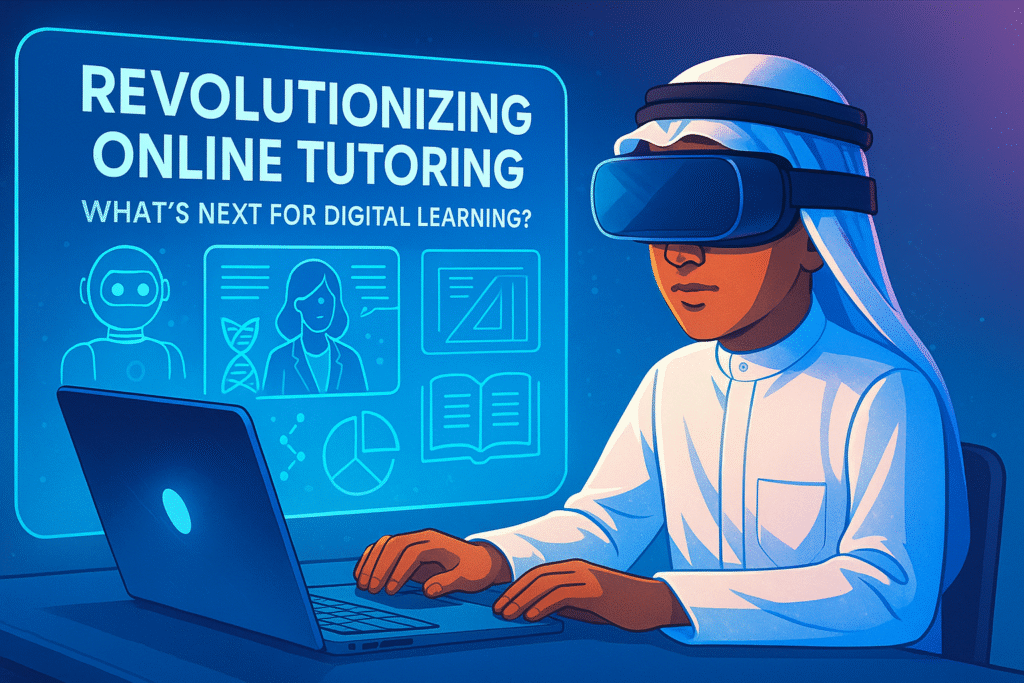
Online tutoring is moving beyond simple video calls. AI-driven personalization, immersive VR/AR classrooms, micro-lessons, and data-rich success coaching are converging to create a learning environment that feels tailor-made for every student—whether they’re revising past-paper questions in Dubai or dissecting a virtual frog in Doha. Market forecasts show double-digit growth through 2025, while new research confirms that adaptive platforms and microlearning boost both retention and confidence. Below, we unpack the innovations reshaping digital tutoring and outline what they mean for families in the Gulf and beyond.
From “Zoom Classes” to Intelligent Ecosystems
Explosive Market Growth
Global online-tutoring revenue is projected to jump from US $11.1 billion in 2024 to US$ $12.8 billion in 2025—a 14.8 % CAGR—driven by flexible schedules, exam competition, and easy access to niche experts (The Business Research Company). In the Middle East & Africa alone, private tutoring surpassed US $20 billion in 2023 and is still accelerating (Stellar Market Research).
Personalisation at Scale
AI engines now analyze millions of learner interactions to recommend bite-sized tasks, predict stumbling blocks, and even auto-grade open-ended answers (Number Analytics). Adaptive-learning research shows significant gains in performance and engagement when courses adjust in real time (SpringerOpen) (Whatfix)
Technology Pillars Revolutionising Tutoring
1. AI-Powered Coaching
- Smart diagnostics: Instant gap analysis pinpoints exactly where a student loses marks.
- Generative practice: AI creates fresh, exam-style questions in seconds, mirroring moves by language-learning giant Duolingo, which is shifting to an “AI-first” model to scale content (Latest news & breaking headlines).
2. Immersive VR / AR Classrooms
By 2024, more than 40 % of K-12 schools in the US are using VR/AR, up from <20 % in 2022; 93 % of teachers believe it improves understanding (Matsh Talent Development). VR headset shipments are expected to grow 25 % annually through 2028, expanding affordable options for home learners (virtualspeech.com).
3. Microlearning & Modular Notes
Studies report that micro-lessons can boost knowledge retention and exam accuracy significantly (VisualSP). Short, focused sessions (15-45 minutes) fit naturally into summer schedules—an approach Axon champions to free nine months of the school year for sports and projects.
4. Data-Driven Success Teams
Dashboards track attendance, quiz scores, and engagement minute-by-minute, enabling coaches to nudge learners or update parents instantly—critical for Gulf families balancing work and study across time zones.
What This Means for Gulf Students
| Trend | Direct Benefit for UAE / Saudi / Qatar Learners |
|---|---|
| AI diagnostics | Pinpoints weak topics early, reducing costly last-minute cramming |
| VR/AR science labs | Hands-on experience without lab-facility barriers |
| Micro-sessions | Aligns with shorter school days and Ramadan schedules |
| Real-time parent updates | Keeps busy parents informed via WhatsApp or Slack |
The Road Ahead: 5 Predictions
- Hyper-personal bundles – Students mix live tutoring, AI chatbots, and VR labs in one subscription.
- Assessment-ready analytics – Platforms auto-produce examiner-style scorecards for schools.
- Credential stacking – Micro-certificates in coding, AI, or design layered over core IGCSE subjects. Digital Learning Institute
- Voice-first tutoring – Arabic/English voice assistants answer homework queries culturally.
- Regional cloud hubs – Gulf governments invest in local EdTech data centers to cut latency and protect privacy.
How Axon Learning Is Positioning for the Future
- 3-Month Sprint Model: 45-minute micro-lessons, extensive past-paper drill, and weekly VR science demos.
- Success Coordinators: Human coaches plus AI analytics ensure no student is left behind.
- Community Hub: Always-on Slack channels let Gulf parents track progress in real time.
- Free Hybrid Trials: Families can test a live class and an on-demand recording before enrolling.
Conclusion
Digital tutoring is entering its most transformative era yet—shaped by AI, immersive tech, and data-rich coaching. Providers that weave these tools into short, outcome-focused programs will give students a decisive edge. For Gulf learners aiming for A/A* grades without sacrificing summer freedom, platforms like Axon Learning illustrate what the next chapter of online education looks like: personalised, engaging, and laser-focused on results.
Online Tutoring Global Market Report 2025
January 30, 2025 — The online tutoring market size has grown rapidly in recent years. It will grow from $11.15 billion in 2024 to $12.8 billion in 2025 at a compound annual growth …
Middle East & Africa Private Tutorial Market: Industry Analysis and …
Middle East & Africa Private Tutorial Market was valued at USD 20.34 billion in 2023. The Middle East & Africa Private Tutorial Market size is estimated to grow …
5 AI Trends Reshaping Education: Data & Applications
Using an adaptive learning tool to improve student performance and …
February 5, 2024 — Adaptive learning theory follows a teaching approach that tailors the educational experience to the individual learning style of each student.
7 Best Adaptive Learning Platforms in 2025 – Whatfix
September 27, 2023 — Overall, the real-time feedback provided by adaptive learning platforms promotes a supportive and responsive learning environment that optimizes …
Latest news & breaking headlines
Duolingo to replace contract workers with AI
Emerging Technologies in Education: Statistics on AI and VR …
December 26, 2024 — By 2024, over 40% of K-12 schools in the US will use AR/VR, up from less than 20% in 2022. Also, 93% of teachers think VR is good for teaching …
VR Stats for the Training & Education Industry in 2025 – VirtualSpeech
Projections indicate that between 2024 and 2028, we can expect an increase of 5.5 million VR headsets, signifying a substantial growth rate of approximately 25 …
8 studies that prove microlearning can’t be ignored | VisualSP
February 25, 2025 — 8 studies that show microlearning’s benefits · 1. Improves retention significantly · 2. Improves accuracy and confidence · 3. Doing better in exams.
